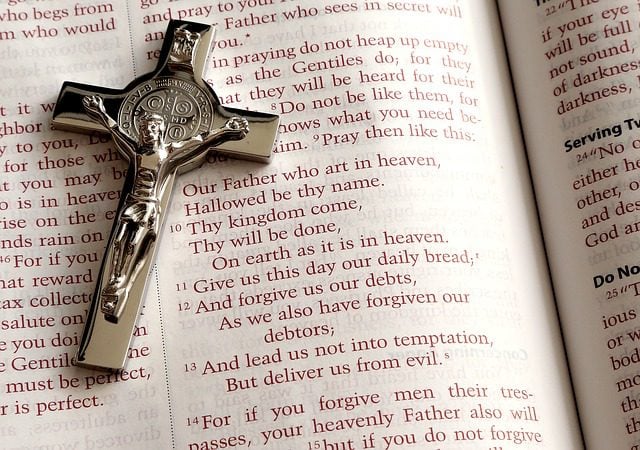Dr. Geisler analyzes the Jerusalem Council in the context of his response to Catholic claims that “there is a God-ordained unity to the church. This unity is manifested in two ways: a unity of faith and a unity of communion” (p. 279). I shall be citing his two-paragraph treatment of it in its entirety and examining each piece of it.
[T]he Jerusalem conference was only confirmatory of the revelation Paul had previously received directly from God. . . . it was only confirmatory of the revelation already given by and confirmed by God to an apostle (Gal. 1:11-12). (p. 284)
The problem here is that the passage Geisler cites has nothing directly to do with the subject matter of the council (mainly, circumcision and whether it is required of Gentile converts to Christianity). It simply stated that Paul’s gospel “is not man’s gospel” and “came through a revelation of Jesus Christ” (RSV). Yes, of course. No one (Catholic or Protestant) disagrees with that. It may be (despite the non sequitur prooftext given) that Geisler is contending that Paul already received the “new” knowledge from God about circumcision. That would at least be relevant to the discussion.
*
Assuming that is the case, the Jerusalem Council is generally dated to 50 AD. The Pauline epistles were all
almost certainly written after that date. The earliest: 1 and 2 Thessalonians, written perhaps a year or two after the council, do not mention circumcision, in any event. Therefore, anything that Paul wrote about circumcision (in his biblical epistles) was written after the council, and we can’t say that he had a full view of the scope of circumcision with regard to Gentile converts at the time he went to the council, let alone a “revelation” from God. All we know is:
Acts 15:1-2 But some men came down from Judea and were teaching the brethren, “Unless you are circumcised according to the custom of Moses, you cannot be saved.” [2] And when Paul and Barnabas had no small dissension and debate with them, Paul and Barnabas and some of the others were appointed to go up to Jerusalem to the apostles and the elders about this question.
The text doesn’t say that St. Paul already knew the definitive answer to the question, by direct revelation. Rather, it was to be decided by “apostles and elders” in Jerusalem: at that time still the administrative center of the new Christian movement.
Geisler never mentions the revelation that St. Peter indeed had already received, related to the council. He’s perceived as “the Catholic guy” (being the leader of the twelve disciples and the first pope), so it’s not in Geisler’s interest to highlight him. God gave St. Peter a vision of the cleanness of all foods (contrary to the Jewish Law: see Acts 10:9-16). This was in the next chapter after the one which describes Paul’s conversion. St. Peter is already learning about the relaxation of Jewish dietary laws, and is eating with uncircumcised men, and is ready to proclaim the gospel widely to the Gentiles (Acts 10 and 11).
This was the secondary decision of the Jerusalem Council, and Peter referred to his experiences with the Gentiles at the council (Acts 15:7-11). The council then decided — with regard to food –, to prohibit only that which “has been sacrificed to idols and from blood and from what is strangled” (15:29). Thus, we have no data to suggest that St. Paul had already received from God the notion that Gentiles didn’t have to be circumcised, while St. Peter did receive a revelation about the cleanness of virtually all foods. So why is Geisler only talking about Paul above? All the biblical account says about St. Paul is: “they listened to Barnabas and Paul as they related what signs and wonders God had done through them among the Gentiles” (Acts 15:12). That’s it: merely part of one verse . . .
There was no new infallible declaration from God. (p. 284)
This is untrue. There certainly was. A letter was prepared that “seemed good to the Holy Spirit and to us” (15:28). Paul and others (15:22, 27) were then sent to Antioch, where they “delivered the letter” (15:30). Then Paul went with Silas to Syria and Cili’cia, Derbe, Lystra, and Ico’nium (15:40-41; 16:1-2). Then we are told:
Acts 16:4 As they went on their way through the cities, they delivered to them for observance the decisions which had been reached by the apostles and elders who were at Jerusalem.
The decision was to be observed. It was binding on believers everywhere that Paul went to. Clearly, this was a very authoritative decision (in effect if not also by nature, infallible) that was to be applied church-wide. In practice; historically, it was: henceforth, circumcision would not again be required for Gentile Christians. This is Catholic ecclesiology and Church authority. Protestants, after all (as they endlessly inform us) do not accept anything as of infallible authority, except for Holy Scripture. Any Protestant could, consistently with their rule of faith, declare about the Jerusalem Council: “I don’t care what they decided there. It’s not infallible; therefore, I can dissent in good faith and believe something differently, based on my interpretation of Scripture passages a, b, c, d . . .”
[T]he inquiry into the issue was a voluntary one, coming from the church in Antioch (Acts 15:2-3). (p. 284)
Granted, but the decision rendered was not “voluntary” or optional. It was intended for strict “observance”.
[T]he nature of the event was more of a conference than a church council, since it was not only apostles and elders but also the other “brethren” who made the decision (Acts 15:22-23). (pp. 284-285)
It is universally referred to as a “council”. Geisler foolishly refers to it as a “conference” to try to make it seem less authoritative and church-wide than it was. I could cite a hundred examples, but I’ll provide just one: “The first council of the Church was that described in Acts 15” (Oxford Dictionary of the Christian Church, “Council”: p. 351).
*
He tries to contend that plain old “brethren” as well as “apostles and elders” made the decision, but this isn’t true. Acts 15: 23 in the RSV states: “”The brethren, both the apostles and the elders, to the brethren . . .” This might sound like “brethren” who were not apostles or elders, helped write the letter, but it is saying that apostles and elders are “brethren” as well. Hence, NIV translates: “The apostles and elders, your brothers, To the Gentile believers . . .” New American Standard Bible (NASB) reads: “”The apostles and the brethren who are elders, . . .” Etc. That‘s what the text means. The “whole church” was involved only in deciding who to send with Paul and Barnabas (15:22).
*
Of much more significance is the fact that elders were working alongside apostles. This has direct implications for the Catholic belief in apostolic succession, as I argued recently in an
article on the Jerusalem Council:
What is striking, then, is that the two offices in the Jerusalem council are presented as if there is little or no distinction between them, at least in terms of their practical authority. . . . They seem to be presented as having in effect, “one man one vote.” They “consider” the issue “together” (15:6). It’s the same for the “decisions which had been reached” (16:4).
Therefore, if such a momentous, binding decision was arrived at by apostles and elders, it sure seems to suggest what Catholics believe: that bishops are successors of the apostles. We already see the two offices working together in Jerusalem and making a joint decision. It’s a concrete example of precisely what the Catholic Church claims about apostolic succession and the sublime authority conveyed therein.
[C]ontrary to the Catholic claim, if anyone dominated the conference it was not Peter but James, giving as he did the last word in the discussion (15:13-21). (p. 285)
From Acts 15, we learn that “after there was much debate, Peter rose” to address the assembly (15:7). The Bible records his speech, which goes on for five verses. Then it reports that “all the assembly kept silence” (15:12). Paul and Barnabas speak next, not making authoritative pronouncements, but confirming Peter’s exposition, speaking about “signs and wonders God had done through them among the Gentiles” (15:12). Then when James speaks, he refers right back to what “Simeon [Peter] has related” (15:14). To me, this suggests that Peter’s talk was central and definitive. James speaking last could easily be explained by the fact that he was the bishop of Jerusalem and therefore the “host.”
[T]he language of the statement is moderate, using phrases like “it seemed good to us.” (p. 285)
This is untrue as well. When it had to do with selection of men to send, the text reads, “it seemed good to the apostles and the elders, with the whole church” (15:22) and “it has seemed good to us” (15:25). But when we get to the actual official letter, the language is: “it has seemed good to the Holy Spirit and to us” (15:28). That’s a huge difference, isn’t it? But Geisler manages not to mention it, which is beyond silly.
Moreover, St. Luke uses this language at the beginning of the Gospel of Luke (“it seemed good to me also, having followed all things closely for some time past, to write an orderly account for you, most excellent The-oph’ilus”: Lk 1:3). I guess, according to Geisler, that this is a “moderate” espousal of that inspired Gospel, too.
Indeed, the result of the conference was only a “letter” (15:30), not a papal encyclical with the typical language of anathema. (p. 285)
Of course it need not have an anathema, nor be as developed as later papal encyclicals. No one is claiming that it should be like that. The important thing is how authoritative and wide-ranging it is. It was decided by apostles (with elders), confirmed by the Holy Spirit, and sent with St. Paul to be proclaimed in many different cities, for “observance.” That is sublime authority, and is not what Protestants would expect to find in the Bible, given their ecclesiological views.
Finally, the conference recognized the supernatural confirmation of God on the message of Paul (Acts 15:12), which was the divinely appointed sign that he spoke by revelation from God (2 Cor. 12:12; Heb. 2:3-4). (p. 285)
This is neither here nor there. No one disagrees with this, and it has no bearing on Catholic-Protestant disagreements on ecclesiology. But it sounds nice, and mentions Paul (whom Protestants always consider to be “their guy”: as if he teaches their doctrines), so Geisler threw it in for good effect (I guess).
For related reading, see:
*
*
*
*
*
*****













